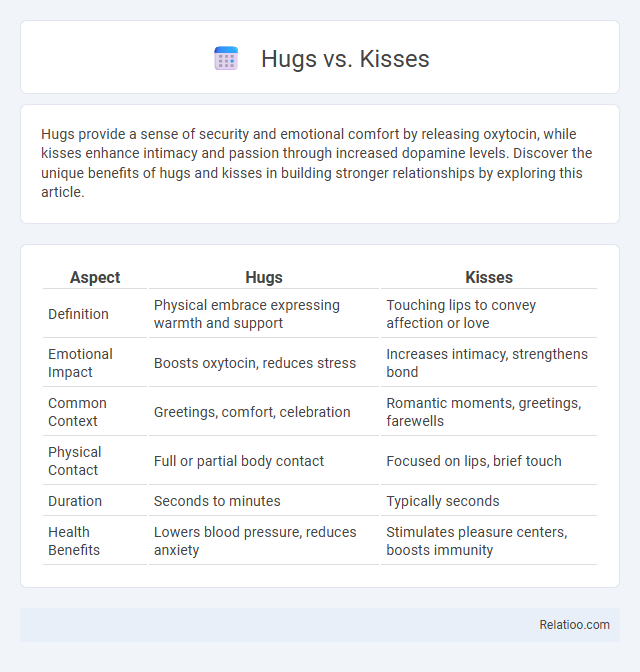Hugs provide a sense of security and emotional comfort by releasing oxytocin, while kisses enhance intimacy and passion through increased dopamine levels. Discover the unique benefits of hugs and kisses in building stronger relationships by exploring this article.
Table of Comparison
| Aspect | Hugs | Kisses |
|---|---|---|
| Definition | Physical embrace expressing warmth and support | Touching lips to convey affection or love |
| Emotional Impact | Boosts oxytocin, reduces stress | Increases intimacy, strengthens bond |
| Common Context | Greetings, comfort, celebration | Romantic moments, greetings, farewells |
| Physical Contact | Full or partial body contact | Focused on lips, brief touch |
| Duration | Seconds to minutes | Typically seconds |
| Health Benefits | Lowers blood pressure, reduces anxiety | Stimulates pleasure centers, boosts immunity |
Introduction: The Power of Physical Affection
Physical affection, including hugs, kisses, and touch, plays a vital role in human connection and emotional well-being. Each form conveys unique messages of comfort, love, and support, triggering the release of oxytocin and reducing stress hormones. Understanding how your body responds to these affectionate gestures can enhance your relationships and promote a deeper sense of security and happiness.
Hugs vs Kisses: Understanding the Differences
Hugs provide a full-body embrace that conveys warmth, comfort, and emotional support, often releasing oxytocin to strengthen social bonds. Kisses are more intimate, typically involving lip contact and signaling affection, love, or passion, with cultural variations in meaning and context. The key difference lies in physical contact extent and emotional intimacy, as hugs offer safer, broader expressions of care while kisses tend to carry deeper romantic or personal significance.
Psychological Benefits of Hugs
Hugs activate the release of oxytocin, reducing stress hormones like cortisol and promoting feelings of trust and safety. Studies show regular hugging lowers blood pressure and enhances the immune system by increasing natural killer cell activity. While kisses and touch also convey affection, hugs uniquely combine physical contact with emotional depth, maximizing psychological well-being through increased empathy and reduced anxiety.
The Emotional Impact of Kisses
Kisses create a powerful emotional connection by triggering the release of oxytocin, often called the "love hormone," which enhances feelings of trust and bonding. The intimate act of kissing can reduce stress levels, lower anxiety, and promote a sense of security, making it uniquely impactful compared to hugs or casual touch. Your emotional well-being benefits significantly from the depth of connection fostered through meaningful kisses.
Hugs in Different Relationships
Hugs serve as a powerful form of nonverbal communication, conveying warmth and trust in various relationships such as friendships, romantic partnerships, and family bonds. In friendships, hugs provide comfort and reinforce social connection, while in romantic relationships, they enhance intimacy and emotional security. Within families, hugs promote a sense of belonging and support, reflecting deep emotional ties and reassurance.
Kisses Across Cultures and Contexts
Kisses hold diverse meanings across cultures, symbolizing affection, respect, or greeting depending on the context. In Mediterranean countries, cheek kisses are common social gestures, while in East Asia, kisses are primarily reserved for intimate relationships. Understanding cultural norms around kisses is essential to interpreting their significance correctly in social interactions.
Science Behind Hugs: Oxytocin and Beyond
Hugs stimulate the release of oxytocin, often called the "love hormone," which promotes bonding, reduces stress, and lowers blood pressure, providing significant health benefits. Unlike kisses, which primarily activate dopamine and serotonin pathways related to pleasure and attraction, hugs engage parasympathetic nervous system responses that enhance relaxation and emotional security. Your body's response to touch through hugging triggers the release of endorphins, contributing to pain relief and emotional well-being beyond the effects of mere physical contact.
The Role of Kisses in Bonding and Intimacy
Kisses play a pivotal role in bonding and intimacy by triggering the release of oxytocin, a hormone that fosters emotional connection and trust between individuals. Unlike hugs or casual touch, kisses engage both sensory and emotional pathways, deepening romantic attachment and signaling affection at a more personal level. Studies show that frequent kissing correlates with higher relationship satisfaction and increased feelings of closeness.
When to Choose a Hug Over a Kiss
Choosing a hug over a kiss often depends on the context and the nature of your relationship, as hugs convey comfort, support, and non-romantic affection, making them ideal in friendship or emotional support situations. When physical boundaries are unclear or you wish to express empathy without intimacy, a hug provides a respectful, warm connection that maintains personal space. Your choice to hug rather than kiss honors both emotional sensitivity and appropriateness, ensuring that your gesture is received with comfort and understanding.
Conclusion: Balancing Hugs and Kisses in Daily Life
Balancing hugs and kisses in daily life strengthens emotional connections and enhances overall well-being by providing comfort and expressing affection. Both gestures activate the release of oxytocin, reducing stress and fostering intimacy, but their impact varies based on personal and cultural preferences. Prioritizing moments that align with Your comfort and relationships ensures meaningful, nurturing interactions.

Infographic: Hugs vs Kisses
 relatioo.com
relatioo.com